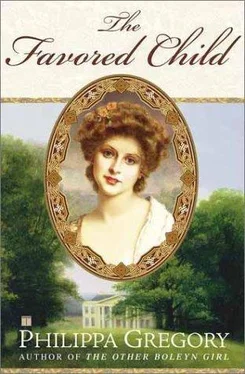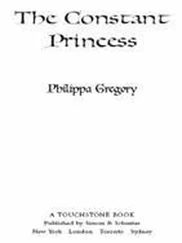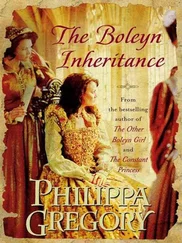Poor fools. Poor silly fools. And I the greatest fool of all to have the chance of such happiness for so many people in my hand and to give it away because I was too much of a coward to stand up and say, ‘I have been cruelly attacked, and it was not my fault.’
They gathered around me in a circle and I knew my face was grim. The child inside my belly stirred and kicked, and I rested one hand on it. I could not help the pang of tenderness I felt every time the little one stirred inside me. But when I saw the eyes of Acre upon me, as leaden as sick cattle, I knew that this child must not be raised here.
This child must not be raised at all.
I should remember what Ralph had said about the French monarchs. I should remember that he said you have to plough before you can sow. The Laceys must be cleaned off Wideacre. The angry ugly French revolutionaries were going to execute their king. I was going to eradicate the Lacey line.
I looked around at the blank faces and I raised my voice. “My husband has ordered me to come and speak to you,’ I said clearly, so that there should be no doubt whose message it was. ‘He has learned that Mr Ralph Megson, who was once manager here, has escaped from prison.’
I looked round quickly, but there was no surprise or delight on any face. They knew already, then. I had thought they would.
‘A reward of two hundred pounds has been offered for information to bring about the capture of Mr Megson and the men who fled with him,’ I said. I was repeating Richard’s words by rote and they would all know well enough that this was an empty formality we were enacting. ‘My husband wishes you to know that if Mr Megson is taken in Acre, he will reward the village handsomely. He will pay one hundred pounds each to every man who assists in the recapture. There will be free flour and free milk for the whole village until sowing time.’
There was a ripple of interest at that, not because they saw the opportunity for earning such wealth, but because they read from that bribe the extent of Richard’s fear. I saw all around me that people were hiding smiles, and I could scarce keep the amused contempt from my own voice.
‘My husband asks me to remind you that Mr Megson was a known rioter, and a dangerous man,’ I said. ‘It is thought that he may be hiding with the gypsies, and you are ordered to report any new gypsy families arriving on the common at once.’
They nodded. I waited a moment, then I turned to go back into the coach. I was unaccountably weary and my back ached. I wanted to drive home as fast as I possibly could and go to bed for the afternoon. I would call for the kitchenmaid to light a fire in my room and watch the flames flicker while the light drained from the window. I just wanted to be in the warm darkness and away from this cold land, and these icy skies and these betrayed people.
‘Miss Julia!’ someone said. I paused. George had folded up the steps, but he paused and held open the door so I could lean forward and see who wanted me.
It was old Mrs Merry.
I flinched away from her worn face as if I feared she might strike me. All my life I had known that round face, as rosy and as wrinkled as a winter apple. But since the loss of her grandson, all the skin had dropped down, and all the lines around her eyes, around her mouth, had lost their habit of smiling.
She came to the front of the crowd and looked up at me, sitting in the rich high-sprung carriage lined with pink silk which Richard had bought for us to replace the bloodstained one abandoned outside Haslemere. I looked down at her like some fairy princess with an old fortune-teller. ‘Yes, Mrs Merry?’
Her pale blue eyes were swimming, and the soft wrinkled skin of her cheeks was wet with her old-woman tears. But I knew that she was not weeping for herself and for her loneliness and the death of her grandson. She was weeping for me. She pitied me.
‘You deserved better than this, sweetheart,’ she said, and her thin voice was full of compassion. A couple within earshot nodded their support and I saw them all looking at me as if I were a victim, as well as Acre. ‘We all hoped for a better world,’ she said. ‘We have been betrayed by the squire, by the power of the gentry. But even though you are gentry yourself, you were not safe. You’re a woman and you have had to learn your master, even as we have learned that lesson again.’
I thought how Richard had mastered me, through my loyalty and love for him, through his violence, and then by the convention of the world which said I had to marry the father of my child.
‘I hate him, Mrs Merry,’ I said. ‘I wish he were dead.’
She nodded, her face showing no shock. ‘Aye,’ she said. ‘You would do. But don’t waste your courage on hating him. Keep yourself to yourself, dearie. And keep up your courage and think of a healthy baby.’
‘I won’t have another squire for Wideacre,’ I said in swift contradiction. I had raised my voice, and a couple of the men turned and listened to what we were saying. ‘I won’t be the mother of a squire. I won’t set a child to have power over the land, nor power over you people. I won’t do that.’
She nodded. ‘It would be a better world indeed if the masters would refuse to rule,’ she said. ‘All Acre has ever done is refuse to obey, and we have been tricked and betrayed out of that resolve time after time.’
I hung my head. It was my high hopes and my bright plans and my quickly dishonoured promises which had tricked them this time. Everything around me, my love of the land, my love of Richard, seemed to have been corrupted and made bad.
‘I must go,’ I said miserably.
Mrs Merry stepped back and George shut the door, his town-bred face impassive. I pulled down the window strap and leaned out. George turned to get up on the back, out of earshot.
‘What can I do?’ I said urgently to Mrs Merry. ‘How can I stop this?’
Her head came up slowly and her eyes met mine and, surprisingly, flowered into a broad sweet smile. ‘Do?’ she said. ‘You need do nothing, Miss Julia!’ George was on the box, smart in his livery, straining his ears, I guessed. ‘Ralph will do it,’ Mrs Merry said sweetly. ‘Ralph is on his way home again.’
‘What. . .?’ I started, but the horses were moving forward and one of the men had taken Mrs Merry’s arm to hold her safely away from the high carriage-wheels. He saw my face, the astonishment, the dawning hope and he grinned at me, the old Acre grin of complete equality.
It was the grin of conspirators who at last have some hopes of victory. The carriage whirled me away and I fell back against Richard’s silk cushions. I knew I was smiling too, and my heart suddenly became light.
‘What did they say in Acre?’ Richard demanded of me. He was at the garden gate, ready to hand me from the carriage.
‘Nothing,’ I said. I let him lead me up the path and into the hall, but I hesitated when he opened the parlour door. ‘I want to rest in my bedroom, Richard. I am very tired.’
He let me go to the stairs, but he wanted more news. ‘Did you say what I told you to say?’ he asked.
‘Yes,’ I said.
‘And what did they say?’ he pressed me.
‘They said nothing,’ I said.
‘Did you speak to no one privately? Did no one mention whether the gypsies were on the common yet? Did no one in particular ask about Megson? What about Ned Smith? – he was always very thick with Megson.’
I looked at Richard, standing at the foot of the staircase, and I raised my eyebrows at him. I was insolent and I knew it. But I had a new courage, a new reason for courage, because I knew that there was a clock ticking away under our life in the Dower House, because I knew that soon the hour was going to strike and the clapper would fall and this whole rotten life would smash to pieces. Two events were converging: the child in my belly was moving slowly to be born, and Ralph was travelling the secret ways from London, concealed in a gypsy cart, along little tracks down hidden paths that the gentry did not even know.
Читать дальше
Конец ознакомительного отрывка
Купить книгу












